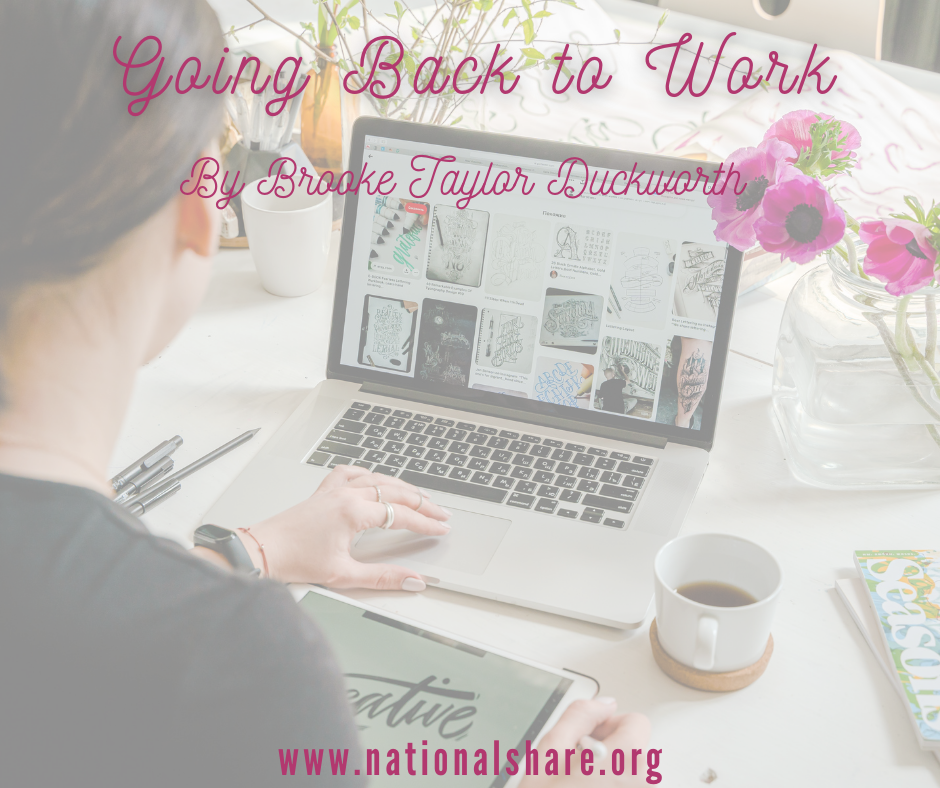
Going Back to Work After a Loss
By: Brooke Taylor Duckworth
Eventually, many grieving parents find themselves in the difficult position of going back to work after some time off. Having spent the weeks that should have been maternity or paternity leave coping with the sorrow of not holding our baby in our arms, we have to maneuver our way back into a weak imitation of our former selves, at least sufficiently enough to make it through a day of work.
Here is a list of suggestions for making that process a little easier. Obviously, every workplace is different, and specific advice would vary hugely depending on what kind of work you do, but I hope you find something helpful here.
1. Ask for what you need.
In a perfect world, everyone would have a boss and coworkers who were compassionate, intuitive, and understanding. Unfortunately, that’s not always the case. You may need to draft a letter explaining what happened so that your story gets told on your own terms.
Even if everyone has already been informed, you may want to go ahead and e-mail some of your coworkers before you return. People will be concerned and most likely they won’t know what to do, so let them know what would be most helpful for you. Keep in mind, the go-to reaction is probably avoidance because people don’t want to upset you, so you might want to say something like, “Although my grief is very intense, I find it helpful and healing to talk about my baby. Please don’t be afraid to ask about him/her.” Alternatively, if you don’t want to discuss your child at work, you might say, “I appreciate your sympathy and concern, and I thank you for respecting my family’s privacy at this time.”
2. Start slow, if you can.
If you can go back to work part-time at first, do it. Start back on a Wednesday or Thursday so you don’t have to face a full week. I was lucky to go back very part-time at first, just three days a week for a few months. While some parents welcome work as a distraction, the process of grief is so exhausting that full-time work can feel almost impossible for a while. Talk to your boss about shortening your days and leaving early for doctor appointments. Things that qualify as a “doctor’s appointment” when you are grieving are: therapy, massage, acupuncture, restorative yoga classes, and actual doctor appointments–my therapist or OB would have written me a note for any of those, had my workplace required it.
3. Take a memento with you.
I wore a bracelet with my daughter’s name on it every single day. No one ever asked me about it, but I knew it was there. If you have your own desk area, you can display a photo of your child, or a special print that represents him or her. You can carry photos in your bag and just share them with people when you feel comfortable. One mama I know carried her baby’s tiny hat in her pocket as a secret link to him. Similarly, wearing a personalized necklace that you can tuck inside your shirt or a ring with an engraving on the inside is a way of keeping your baby close to your heart in a private way (Etsy has tons of options at every price point).
4. Practice your speech but expect the unexpected.
Be prepared to bump into someone who knew you were pregnant but doesn’t know what happened. Prepare in advance what you will say to make that encounter slightly less stressful for you. Don’t feel like you have to apologize for sharing your tragedy, and don’t feel like you have to make it sound like you’re doing just fine now.
If asked about my pregnancy, I would say, “Actually, we lost the baby just before she was due.” Depending on the person and the conversation, I might elaborate on that and share Eliza’s name, but often that sentence was all I could choke out without dissolving into tears. Usually that person would say, “Oh, I’m so sorry.” Then I would nod and say, “Thanks. It’s been really hard.” And then I’d change the subject (or excuse myself to run to the bathroom and cry.)
Keep in mind that no matter how thoroughly you prepare, something will catch you off guard. Someone will say something unintentionally hurtful. Someone will gleefully announce a pregnancy, and their good news will feel like a kick in the teeth. These things happen. Expect they are going to happen and know that you’ll make it through.
5. Remember, it’s okay to cry.
It’s great if you have an office where you can close the door for privacy. Hopefully there’s at least a conveniently located restroom where you can go when you can’t hold back tears, but it’s completely okay for you to cry–even if people can see you. You are a bereaved parent whose baby has just died. No one should expect you not to be upset. Be gentle with yourself. I cried in front of my boss (twice), various co-workers, and I almost cried in front of a well- meaning student. It happens. We are all human. Every tear you cry now is one less tear you’ll have to cry tomorrow.
6. Drink hot beverages.
I carried a hot drink with me everywhere. The warm liquid helped to relax my throat when it was choking up with sobs, but it also gave me something to look at and something to do with my hands.
7. Bribe yourself.
Going back to work is HARD. Promise yourself something small to look forward to. Buy yourself chocolate–the really good stuff. Keep it in your desk drawer. Treat yourself to a soft sweater that can keep you warm in winter or keep off the chill of air conditioning. Wrap up in a new scarf and let it feel like a layer of protection. Promise yourself that when you get home, you’ll watch another episode of Friday Night Lights on Netflix (Coach Taylor won’t let you down, although there is a pregnancy storyline one season). Subscribe to a new podcast. Pick up take out Chinese food after work. Buy a pint of gelato. Get yourself a new pair of running shoes. Watch kittens on YouTube. Give yourself a little reward for making it through the day.
8. Phone a friend and check in with online support groups.
It’s always helpful if you can check in with another loss parent—a “grief buddy” of sorts. This person doesn’t have to be on the same timeline as you, although that worked wonderfully for me. But whether it’s your best friend from childhood, your mom, your spouse, or another parent who has lost a child, put that number in your phone and text them whenever you need moral support. Create a thread at Glow in the Woods and check in with people there. E-mail people who write blogs you connect to, or who have stories like yours posted on Faces of Loss. It’s always nice to have someone say, “I’m sorry” but it is enormously helpful to hear someone say, “Me, too.”
9. Remember that it’s normal to feel like work doesn’t matter.
It’s hard to care about anything at all when the center of your world just died. Focus on your priorities at work, and don’t worry too much about not being invested in what you’re doing. I personally found that eventually teaching came to feel like a bit of a respite from grief, and it was helpful for me to feel competent at something again. I ended up starting a new teaching job nine months after Eliza died, and it was a great move for me (though I still cried in my office every day). Other people discover that they are eventually ready for a new job and a fresh start, or a complete career change that allows them to pursue a different kind of work they find meaningful. Give yourself plenty of time.
10. Be gentle with yourself.
Cut yourself some slack. The goals of your first week back at work are simply survival and self- preservation. Everything else can come later. If you get caught up in a project at work and don’t think about your baby for several minutes at a time, don’t feel guilty about that. At the same time, if you can’t focus on anything because you just keep thinking about your baby, that’s completely understandable. Work will get easier with time, or it will become clear that you are ready to make a significant change. Keep breathing and just take it one day at a time. You’re not alone in this.

About Brooke Taylor Duckworth
Brooke is a writer, educator, and academic living with her family in St. Louis. She has a Ph.D. in English literature and works in higher education. After publishing academic articles on Victorian novels early in her career, Brooke turned to writing and blogging in her personal life to process her grief after her first daughter, Eliza, was unexpectedly stillborn. Brooke is now raising three little girls and spends her free time practicing yoga, playing card games, and reading novels, as well as continuing to write essays and fiction. Her first book, Unimaginable: Life After Baby Loss, was published in February 2021.
